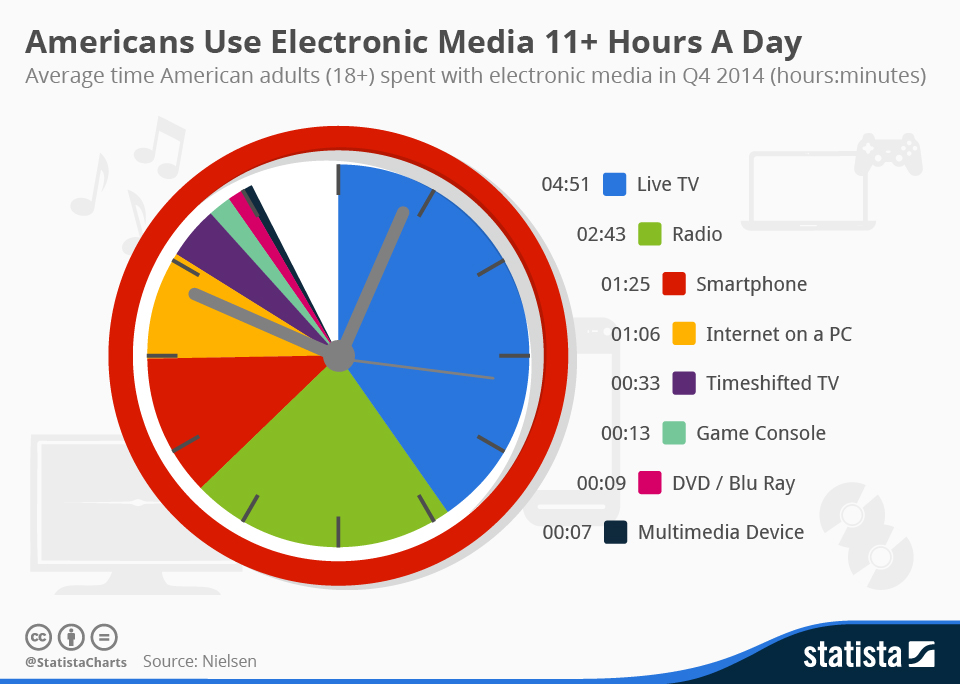Americans use electronic media 11 or more hours a day, according to Nielsen’s Total Audience Report. This puts them at risk of many technology-related health problems.
The bulk of this time is taken up by traditional activities like watching TV and listening to the radio. But it also includes time glued to smartphones, computers and game consoles.
With so many hours spent looking at smaller and smaller screens — often with our necks at awkward angles — it’s only a matter of time before health problems appear.
Recently I interviewed Dr. Mark Jacquot, clinical director of vision care at LensCrafters, for a Healthline story on how technology is affecting the health of millennials. He offered some tips — suitable for people of all ages — to reduce the impact of technology on your eye health … and your sleep.
Take Frequent Eye Breaks
 If you work at a computer all day or spend a lot of your free time on a smartphone, tablet or other electronic device, give your eyes frequent breaks. This will offset some of the technology-related health risks.
If you work at a computer all day or spend a lot of your free time on a smartphone, tablet or other electronic device, give your eyes frequent breaks. This will offset some of the technology-related health risks.
Jacquot suggests following the 20:20:20 rule — for every 20 minutes of screen time, look at something 20 feet away for at least 20 seconds.
“Look up and away, and out a window,” he said. “Give the eyes a chance to relax, defocus and just stare for 20 seconds to half a minute. Give everything a chance to relax.”
Position Digital Screens for Eye Health
You can reduce digital eye strain by changing where you place your electronic screens. This may also reduce your risk of becoming nearsighted over the long run, because your eyes will focus further away.
“For desktops and laptops, kids [and adults] should be far enough away from the screen so that they can reach out with their whole arm and put their palm on the screen,” said Jacquot.
“For handheld devices,” he added, “kids should hold them right below eye level, but far enough away from their eyes so they can still read the screen.”
Turn Off Electronics Before Bedtime
 One of the biggest technology-related health risks is sleep disruption. This can also lead to other health problems, including obesity.
One of the biggest technology-related health risks is sleep disruption. This can also lead to other health problems, including obesity.
Any artificial light before bedtime can throw off your body’s production of melatonin — the hormone that regulates your internal clock and tells you that it’s time to sleep. But the blue light given off by electronics seems to be especially troublesome.
To improve your sleep, turn off electronics at least two hours before your usual sleep time. If you need to keep them on — such as for incoming calls — place your devices where you can’t see any of the light from the screen or those tiny power lights.
Reduce Eye Strain With Computer Glasses
You can’t always avoid technology, especially at work. Some people may spend eight or 10 hours on their computer at work, followed by time on their own smartphones, laptops or tablets at home.
This can add up to considerable digital eye strain. But special glasses may reduce the stress on your eyes by taking on some of the focusing work.
“We recommend in some cases a very mild pair of computer or reading glasses to wear over their contact lenses,” said Jacquot, “or even if they’re not wearing any correction for distance, just to take some of the edge off.”
If you have any questions about which type of glasses to wear, check with your eye doctor.
Technology-related health risks are not inevitable. But as with most things, the key to healthy eyes and sleep is moderating your use of electronics and being proactive when it comes to taking care of your body.
“Screens are part of life, so we’re not going to eliminate screen use,” said Jacquot. “But there are some things that readers can do to ease the discomfort and minimize any changes that are going to take place with their vision.”
_____
Chart: Americans Use Electronic Media 11+ Hours A Day by Statista



